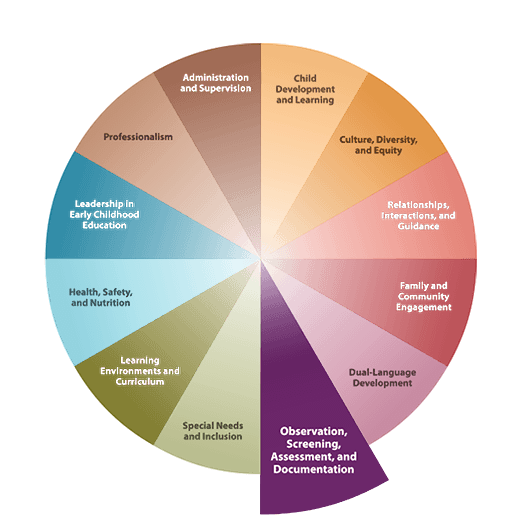Observation, screening, and assessment include processes for gathering, interpreting, applying, and sharing information in a manner that recognizes children's strengths and builds upon their previous experiences. They are important tools for understanding children individually and in groups, and for the purposes of planning environments, curriculum, and other learning experiences. For example, to support effective observation and assessment practice, the CDE has developed a tool called the Desired Results Developmental Profile (DRDP), which is aligned with the preschool learning foundations and the infant/toddler learning and development foundations.
In general, this competency area addresses the knowledge and skills that early childhood educators need in order to conduct responsible, ethical, and effective observation, screening, and assessment of young children and the identification of special needs. It includes an understanding of the goals, uses, benefits, and limitations of various assessment approaches. Also included are the importance of, and strategies for, working with families when using observation, screening, and assessment; principles of developmentally appropriate, culturally and linguistically sensitive, and individually meaningful observation, screening, and assessment; the relationship between observation, screening, assessment, and decision making and planning; program evaluation; confidentiality and privacy; and the role of early childhood educators or other professionals in these processes.
Download the California ECE Competencies
This document requires the Adobe Acrobat Reader. Download the plug-in.

Framing questions identify some of the major themes in this competency. They provide you with a starting point. As you explore this competency, add your own framing questions for issues you want to further examine.
Keep these dispositions in mind as you explore the Framing Questions. If you mindfully adopt these dispositions, you will realize the Desired Outcomes for Practitioners and for Children.
The CompSAT Keys to Reflection and Inquiry offer you a protocol to use in whatever setting you work as an early childhood educator. Learn how you can integrate the six Keys into your work. Select one of the Keys below to practice reflecting with questions related to the competency area of Observation, Screening, Assessment, and Documentation.

Choose from one of the Keys below to view additional information related to this Competency!

Journaling is a great way to record your experiences, keep track of your questions, and make sense of your choices and their outcomes. Journaling lends itself nicely to portfolio work. It's largely a narrative format, but can be enhanced by the addition of photos, sketches, and doodles. Journaling can be done on the computer, or can it can be done using plain, blank notebooks, a pen, and colored pencils.
